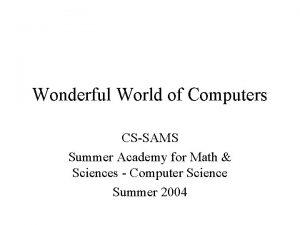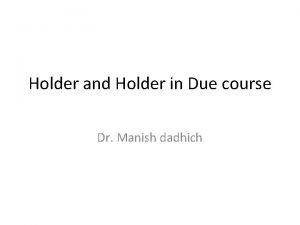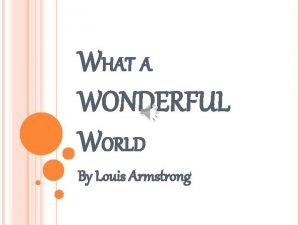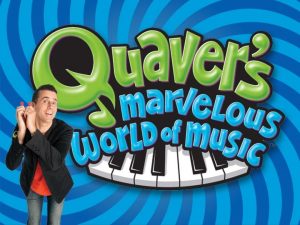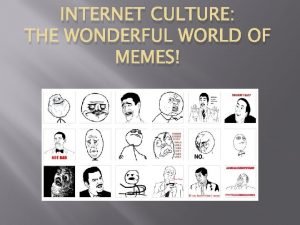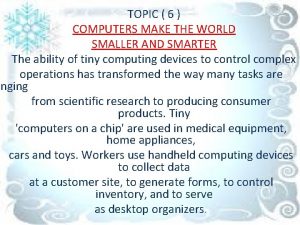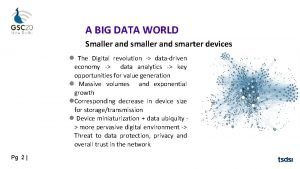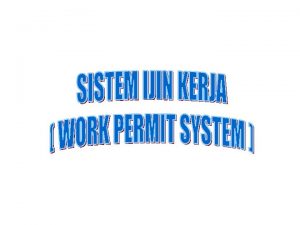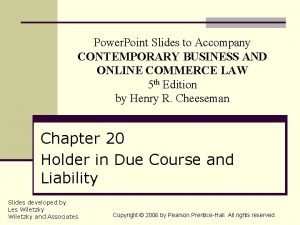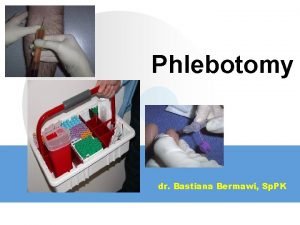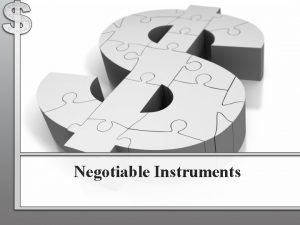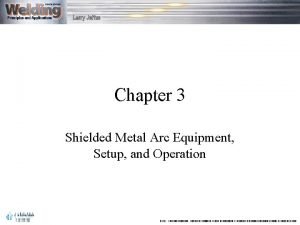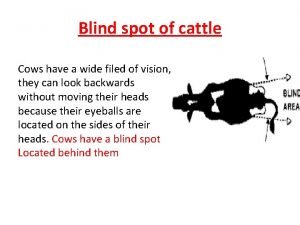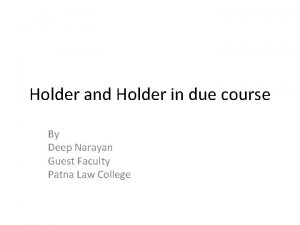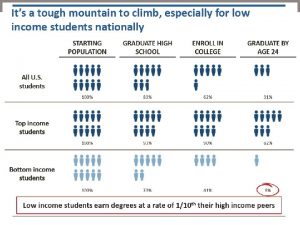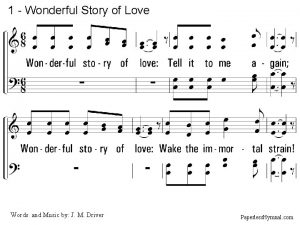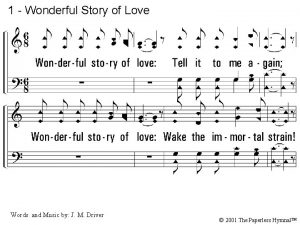The Wonderful World of Computers Larry Holder The
























- Slides: 24

The Wonderful World of Computers Larry Holder The University of Tennessee at Martin

It all began with the ABC in the 1930’s http: //archive. computerhistory. org/resources/physical-object/Atanasoff_Berry/

Followed by the ENIAC in the 40’s The ENIAC contained 17, 468 vacuum tubes and 5 million hand-soldered joints. It weighed about 30 tons, was 8 × 3 × 100 feet in size, occupied an area of 1, 800 square feet, and used 150 k. W of electricity. and the Univac in the 50’s

The Transistor: perhaps the most important development of the 20 th century The transistor is the fundamental building block of modern electronic devices. First practically implemented in 1947 by American physicists John Bardeen, Walter Brattain, and William Shockley, the transistor revolutionized the field of electronics, and paved the way for smaller and cheaper radios, calculators, and computers, among other things. The transistor is on the list of IEEE milestones in electronics, and Bardeen, Brattain, and Shockley shared the 1956 Nobel Prize in Physics for their achievement. https: //en. wikipedia. org/wiki/Transistor http: //i 0. wp. com/sostrenews. com/wp-content/uploads/2015/10/us__en_us__ibm 100__603 calc__603_vacuum__620 x 350. jpg http: //www. wylie. org. uk/technology/semics/Ediswan. htm

But the real revolution began in the 70’s

Not to mention the Internet’s beginnings in 1969 (no thanks to Al Gore) http: //archive. computerhistory. org/projects/Visible_Storage/VSR_detail_panels/ http: //nasa. gov http: //www. woodstock. com/gallery/home-gallery/

Remember any of these Micros?

The Very Basics… It all boils down to… INPUT Processing OUTPUT

And Bits and Bytes Everything in the computer is stored as: 1, 024 Bytes = Kilobyte (KB) 1, 024 KB = Megabyte (MB) 1, 204 MB = Gigabyte (GB) 1, 204 GB = Terabyte (TB) 1, 204 TB = Petabyte (PB) 1, 024 PB = Exabyte (EB) 1, 024 EB = Zettabyte (ZB) 1, 024 ZB = Yottabyte (YB) 0 1 8 bits (Binary Digits) = 1 Byte 1, 024 1, 048, 576 1, 073, 741, 824 1, 099, 511, 627, 776 1, 125, 899, 906, 842, 624 1, 152, 921, 504, 606, 846, 976 1, 180, 591, 620, 717, 411, 303, 424 1, 208, 925, 819, 614, 629, 174, 706, 176 A TRILLION x TRILLION … Wow, that’s a Yotta bytes!!!

Binary is found in Nature Electricity Magnetism Light http: //nerdbusiness. com/blog/programming-wire-light-bulbs-battery/ http: //www. extremetech. com/computing/113237 -ibm-stores-binary-data-on-12 -atoms https: //delightlylinux. wordpress. com/2014/09/05/binary-lesson-7 -bits-and-bytes/

The processing is handled by the CPU (Central Processing Unit)

CPU’s are rated in Gigahertz Giga = Billion Hertz = Cycle Gigahertz = Billions of Cycles per Second

The Machine Cycle http: //cpu. pascalturbo. net/tag/cpu-machine-cycle

And it needs lots of RAM! (Memory)

How much RAM? 1990 – 4 MB (about 4 million bytes) at $50 per MB = $200 2016 – 4 GB (about 4 BILLION bytes) = $20 4 GB at 1990’s prices? 4 GB = 4, 096 MB x $50/MB = $204, 800

Memory vs Hard Drive RAM Paging File (Virtual Memory) Hard Drive Typical 1 to 3 TB

The Layers of Computing The “User” (you) Application Software (the “apps”) Systems Software (Windows, Mac. OS, Linux) Hardware (the nuts and bolts)

Storing our Data

Connecting our Stuff USB (Universal Serial Bus) HDMI (for display to TV, etc) Ethernet (for Internet)

Everything’s a Computer!!!

And the Internet has changed the world What did we do before: Amazon Travelocity Airbnb Facebook You. Tube Twitter Google Gmail Wikipedia … etc. … http: //arstechnica. com/unite/2015/10/the-future-is-the-internet-of-things-deal-with-it/

Percentages of Computers in Household and Internet Use at Home between 1984 and 2011 https: //www. census. gov/prod/2013 pubs/p 20 -569. pdf

Internet Users Worldwide First graphical web browser, NCSA Mosaic, released in 1993 http: //www. internetlivestats. com/internet-users/

lholder@utm. edu www. utm. edu/staff/lholder This presentation is purely for non-profit educational purposes. Any images taken from various websites are used under Fair Use. Additional credits or removal of images will be done upon request.
 The wonderful world of computers
The wonderful world of computers Negotiable instrument act
Negotiable instrument act Holder in due course
Holder in due course Holder in due course
Holder in due course God's love is so wonderful
God's love is so wonderful Wonderful wonderful jesus
Wonderful wonderful jesus Laugh
Laugh Dynamics of what a wonderful world
Dynamics of what a wonderful world What a wonderful world figurative language
What a wonderful world figurative language Quavers marvellous world
Quavers marvellous world Marasmius haematocephalus
Marasmius haematocephalus Internet culture memes
Internet culture memes Computers make the world smaller and smarter answers
Computers make the world smaller and smarter answers Computers make the world smaller and smarter
Computers make the world smaller and smarter Instruksi kerja (work permit)
Instruksi kerja (work permit) Electrode holder preventive maintenance
Electrode holder preventive maintenance Which is a holder in due course?
Which is a holder in due course? Different photographic rays
Different photographic rays Holder flebotomi
Holder flebotomi Indoresement
Indoresement Used for holding and organizing test tubes on
Used for holding and organizing test tubes on In generators the welding current is produced on the ____.
In generators the welding current is produced on the ____. Holder in due course example
Holder in due course example Udder kinch
Udder kinch Olectanon
Olectanon
